Investigating Hotel Policies on Overbooking and Customer Decision-Making
VerifiedAdded on 2022/12/26
|15
|4011
|55
AI Summary
This research proposal aims to investigate hotel policies related to overbooking and its effect on customer decision-making. The case study focuses on The Essence Hotel Carlton in Melbourne, Australia. The study will explore the concept of overbooking, identify hotel policies, analyze their association with customer effects, and recommend effective practices for the hotel. The research will use an exploratory research approach and qualitative methodology for data collection.
Contribute Materials
Your contribution can guide someone’s learning journey. Share your
documents today.
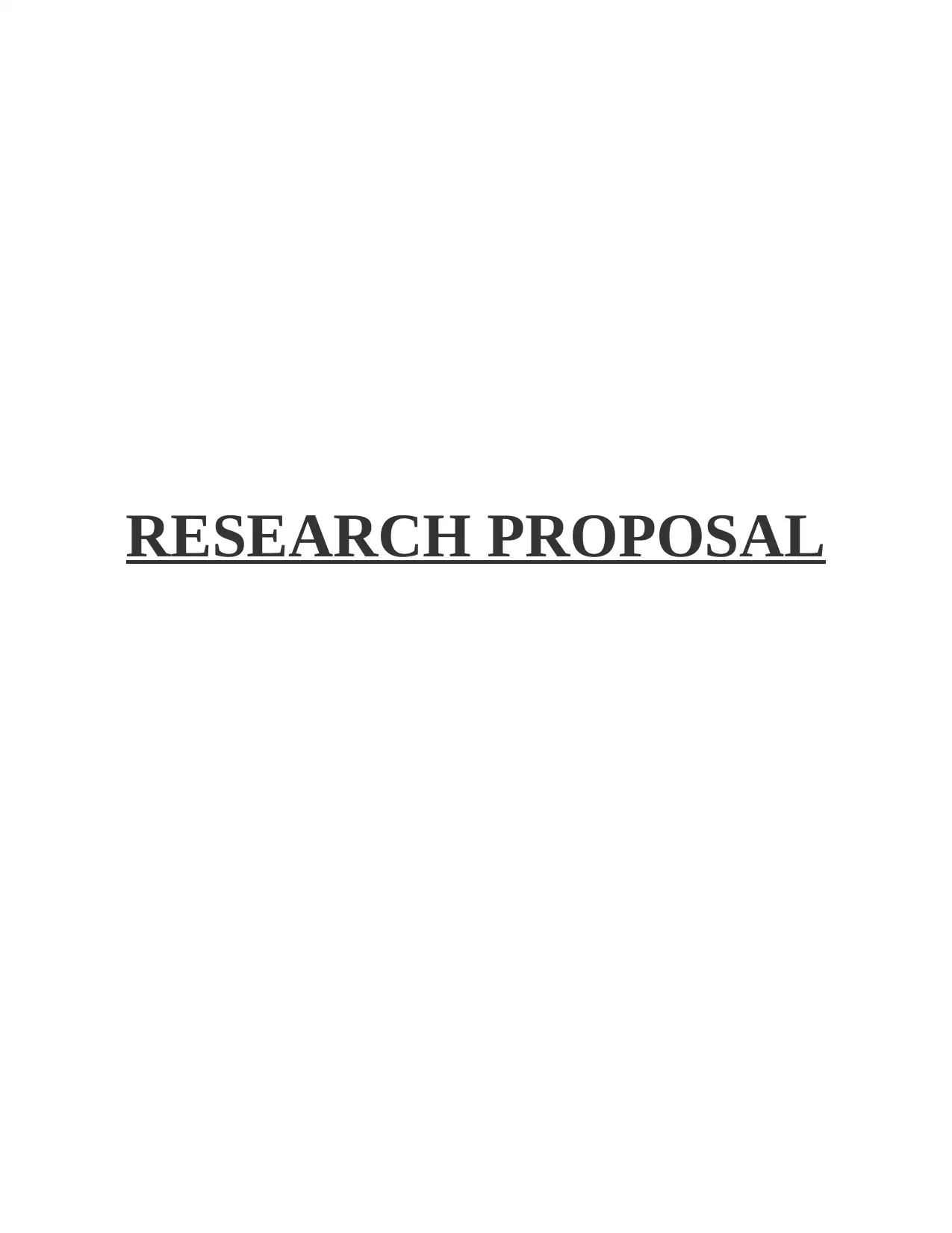
RESEARCH PROPOSAL
Secure Best Marks with AI Grader
Need help grading? Try our AI Grader for instant feedback on your assignments.
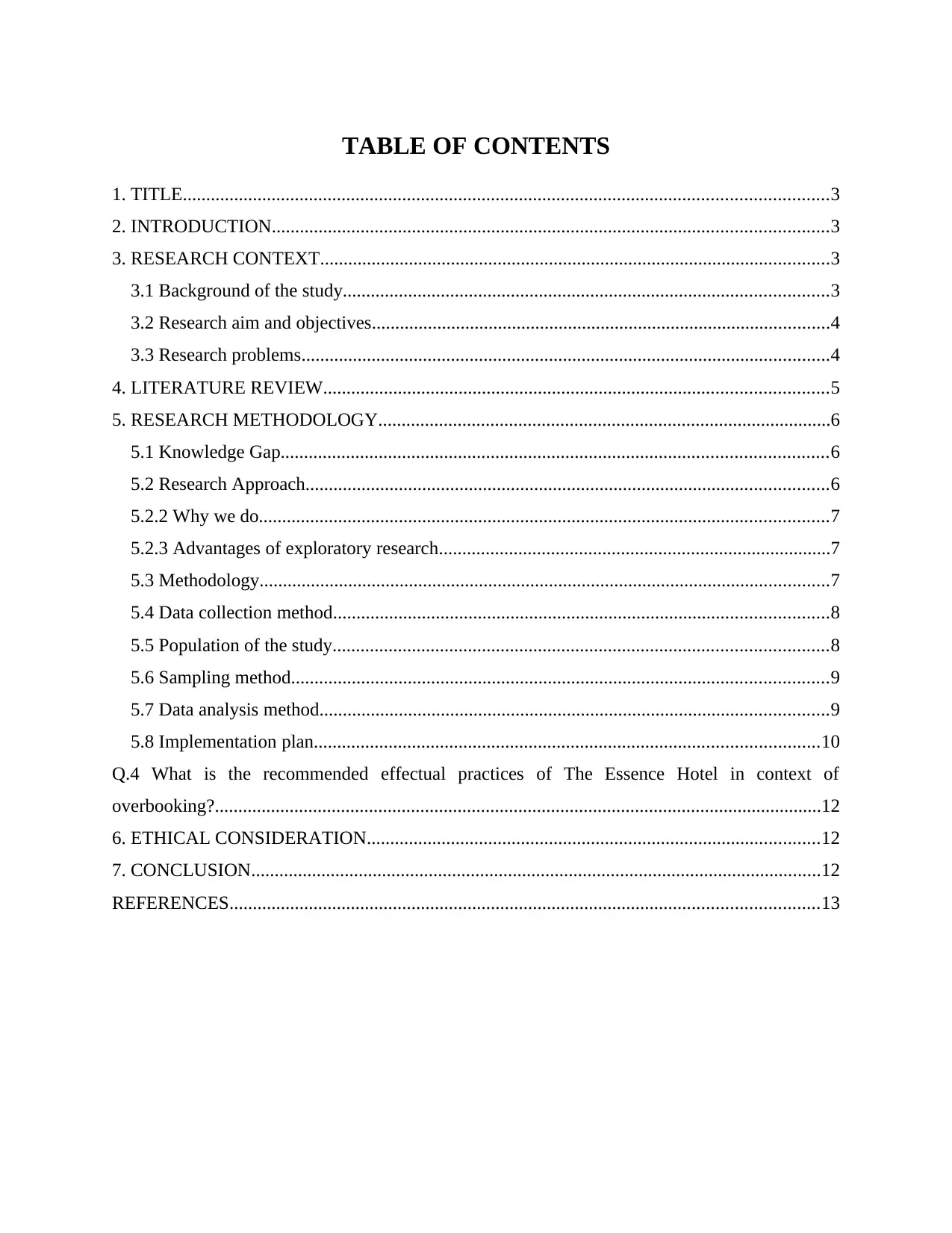
TABLE OF CONTENTS
1. TITLE..........................................................................................................................................3
2. INTRODUCTION.......................................................................................................................3
3. RESEARCH CONTEXT.............................................................................................................3
3.1 Background of the study........................................................................................................3
3.2 Research aim and objectives..................................................................................................4
3.3 Research problems.................................................................................................................4
4. LITERATURE REVIEW............................................................................................................5
5. RESEARCH METHODOLOGY.................................................................................................6
5.1 Knowledge Gap.....................................................................................................................6
5.2 Research Approach................................................................................................................6
5.2.2 Why we do..........................................................................................................................7
5.2.3 Advantages of exploratory research....................................................................................7
5.3 Methodology..........................................................................................................................7
5.4 Data collection method..........................................................................................................8
5.5 Population of the study..........................................................................................................8
5.6 Sampling method...................................................................................................................9
5.7 Data analysis method.............................................................................................................9
5.8 Implementation plan............................................................................................................10
Q.4 What is the recommended effectual practices of The Essence Hotel in context of
overbooking?..................................................................................................................................12
6. ETHICAL CONSIDERATION.................................................................................................12
7. CONCLUSION..........................................................................................................................12
REFERENCES..............................................................................................................................13
1. TITLE..........................................................................................................................................3
2. INTRODUCTION.......................................................................................................................3
3. RESEARCH CONTEXT.............................................................................................................3
3.1 Background of the study........................................................................................................3
3.2 Research aim and objectives..................................................................................................4
3.3 Research problems.................................................................................................................4
4. LITERATURE REVIEW............................................................................................................5
5. RESEARCH METHODOLOGY.................................................................................................6
5.1 Knowledge Gap.....................................................................................................................6
5.2 Research Approach................................................................................................................6
5.2.2 Why we do..........................................................................................................................7
5.2.3 Advantages of exploratory research....................................................................................7
5.3 Methodology..........................................................................................................................7
5.4 Data collection method..........................................................................................................8
5.5 Population of the study..........................................................................................................8
5.6 Sampling method...................................................................................................................9
5.7 Data analysis method.............................................................................................................9
5.8 Implementation plan............................................................................................................10
Q.4 What is the recommended effectual practices of The Essence Hotel in context of
overbooking?..................................................................................................................................12
6. ETHICAL CONSIDERATION.................................................................................................12
7. CONCLUSION..........................................................................................................................12
REFERENCES..............................................................................................................................13
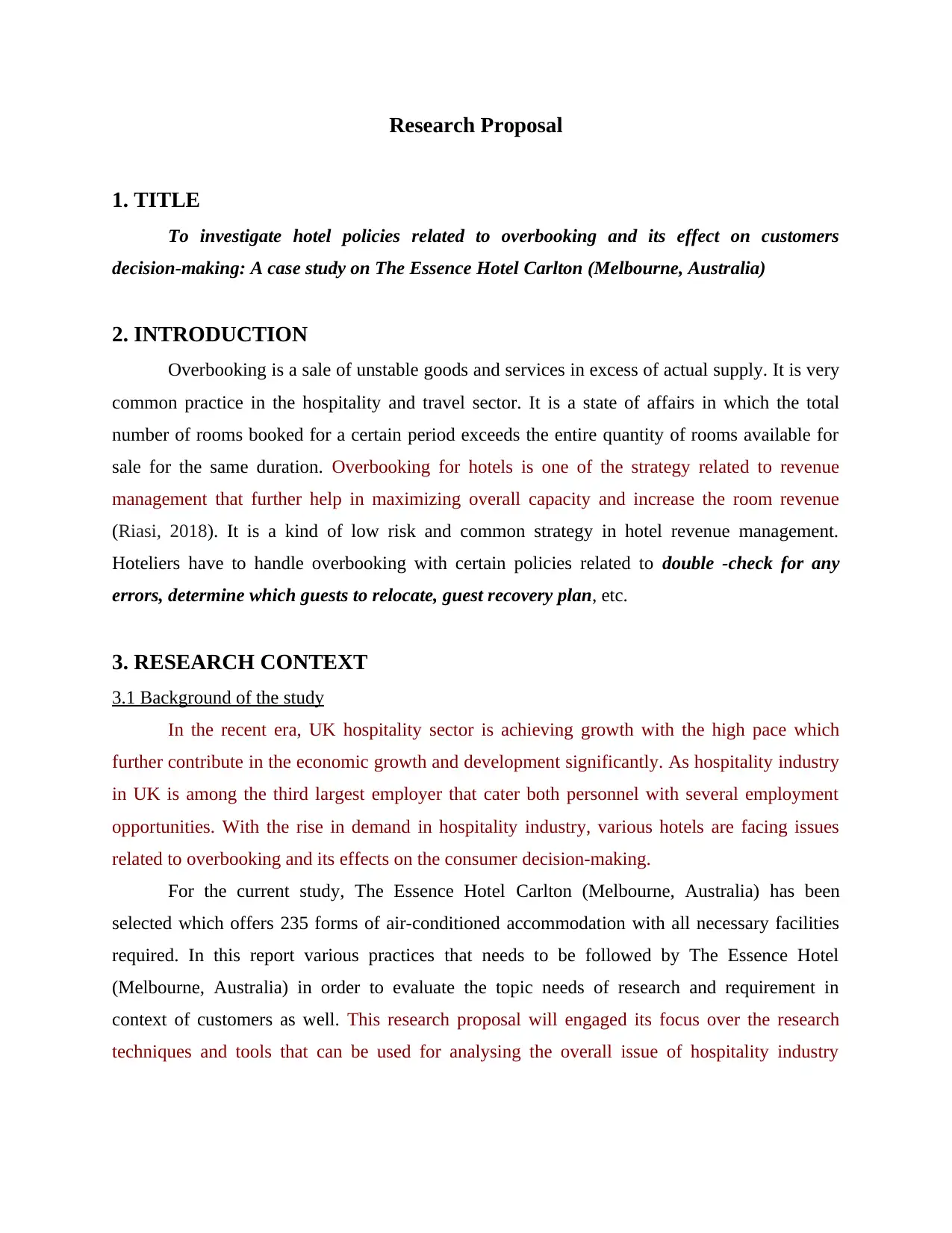
Research Proposal
1. TITLE
To investigate hotel policies related to overbooking and its effect on customers
decision-making: A case study on The Essence Hotel Carlton (Melbourne, Australia)
2. INTRODUCTION
Overbooking is a sale of unstable goods and services in excess of actual supply. It is very
common practice in the hospitality and travel sector. It is a state of affairs in which the total
number of rooms booked for a certain period exceeds the entire quantity of rooms available for
sale for the same duration. Overbooking for hotels is one of the strategy related to revenue
management that further help in maximizing overall capacity and increase the room revenue
(Riasi, 2018). It is a kind of low risk and common strategy in hotel revenue management.
Hoteliers have to handle overbooking with certain policies related to double -check for any
errors, determine which guests to relocate, guest recovery plan, etc.
3. RESEARCH CONTEXT
3.1 Background of the study
In the recent era, UK hospitality sector is achieving growth with the high pace which
further contribute in the economic growth and development significantly. As hospitality industry
in UK is among the third largest employer that cater both personnel with several employment
opportunities. With the rise in demand in hospitality industry, various hotels are facing issues
related to overbooking and its effects on the consumer decision-making.
For the current study, The Essence Hotel Carlton (Melbourne, Australia) has been
selected which offers 235 forms of air-conditioned accommodation with all necessary facilities
required. In this report various practices that needs to be followed by The Essence Hotel
(Melbourne, Australia) in order to evaluate the topic needs of research and requirement in
context of customers as well. This research proposal will engaged its focus over the research
techniques and tools that can be used for analysing the overall issue of hospitality industry
1. TITLE
To investigate hotel policies related to overbooking and its effect on customers
decision-making: A case study on The Essence Hotel Carlton (Melbourne, Australia)
2. INTRODUCTION
Overbooking is a sale of unstable goods and services in excess of actual supply. It is very
common practice in the hospitality and travel sector. It is a state of affairs in which the total
number of rooms booked for a certain period exceeds the entire quantity of rooms available for
sale for the same duration. Overbooking for hotels is one of the strategy related to revenue
management that further help in maximizing overall capacity and increase the room revenue
(Riasi, 2018). It is a kind of low risk and common strategy in hotel revenue management.
Hoteliers have to handle overbooking with certain policies related to double -check for any
errors, determine which guests to relocate, guest recovery plan, etc.
3. RESEARCH CONTEXT
3.1 Background of the study
In the recent era, UK hospitality sector is achieving growth with the high pace which
further contribute in the economic growth and development significantly. As hospitality industry
in UK is among the third largest employer that cater both personnel with several employment
opportunities. With the rise in demand in hospitality industry, various hotels are facing issues
related to overbooking and its effects on the consumer decision-making.
For the current study, The Essence Hotel Carlton (Melbourne, Australia) has been
selected which offers 235 forms of air-conditioned accommodation with all necessary facilities
required. In this report various practices that needs to be followed by The Essence Hotel
(Melbourne, Australia) in order to evaluate the topic needs of research and requirement in
context of customers as well. This research proposal will engaged its focus over the research
techniques and tools that can be used for analysing the overall issue of hospitality industry
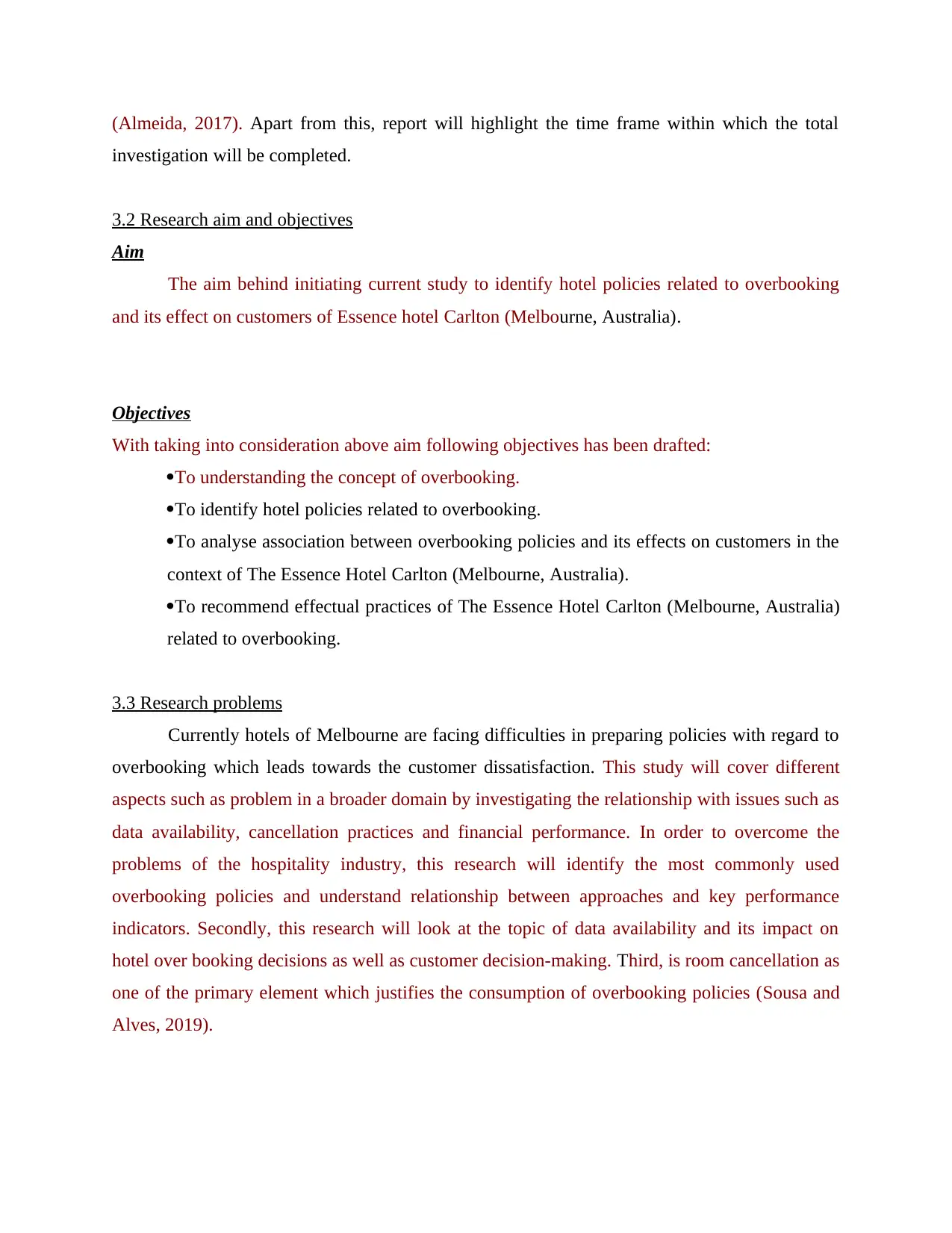
(Almeida, 2017). Apart from this, report will highlight the time frame within which the total
investigation will be completed.
3.2 Research aim and objectives
Aim
The aim behind initiating current study to identify hotel policies related to overbooking
and its effect on customers of Essence hotel Carlton (Melbourne, Australia).
Objectives
With taking into consideration above aim following objectives has been drafted:
To understanding the concept of overbooking.
To identify hotel policies related to overbooking.
To analyse association between overbooking policies and its effects on customers in the
context of The Essence Hotel Carlton (Melbourne, Australia).
To recommend effectual practices of The Essence Hotel Carlton (Melbourne, Australia)
related to overbooking.
3.3 Research problems
Currently hotels of Melbourne are facing difficulties in preparing policies with regard to
overbooking which leads towards the customer dissatisfaction. This study will cover different
aspects such as problem in a broader domain by investigating the relationship with issues such as
data availability, cancellation practices and financial performance. In order to overcome the
problems of the hospitality industry, this research will identify the most commonly used
overbooking policies and understand relationship between approaches and key performance
indicators. Secondly, this research will look at the topic of data availability and its impact on
hotel over booking decisions as well as customer decision-making. Third, is room cancellation as
one of the primary element which justifies the consumption of overbooking policies (Sousa and
Alves, 2019).
investigation will be completed.
3.2 Research aim and objectives
Aim
The aim behind initiating current study to identify hotel policies related to overbooking
and its effect on customers of Essence hotel Carlton (Melbourne, Australia).
Objectives
With taking into consideration above aim following objectives has been drafted:
To understanding the concept of overbooking.
To identify hotel policies related to overbooking.
To analyse association between overbooking policies and its effects on customers in the
context of The Essence Hotel Carlton (Melbourne, Australia).
To recommend effectual practices of The Essence Hotel Carlton (Melbourne, Australia)
related to overbooking.
3.3 Research problems
Currently hotels of Melbourne are facing difficulties in preparing policies with regard to
overbooking which leads towards the customer dissatisfaction. This study will cover different
aspects such as problem in a broader domain by investigating the relationship with issues such as
data availability, cancellation practices and financial performance. In order to overcome the
problems of the hospitality industry, this research will identify the most commonly used
overbooking policies and understand relationship between approaches and key performance
indicators. Secondly, this research will look at the topic of data availability and its impact on
hotel over booking decisions as well as customer decision-making. Third, is room cancellation as
one of the primary element which justifies the consumption of overbooking policies (Sousa and
Alves, 2019).
Secure Best Marks with AI Grader
Need help grading? Try our AI Grader for instant feedback on your assignments.
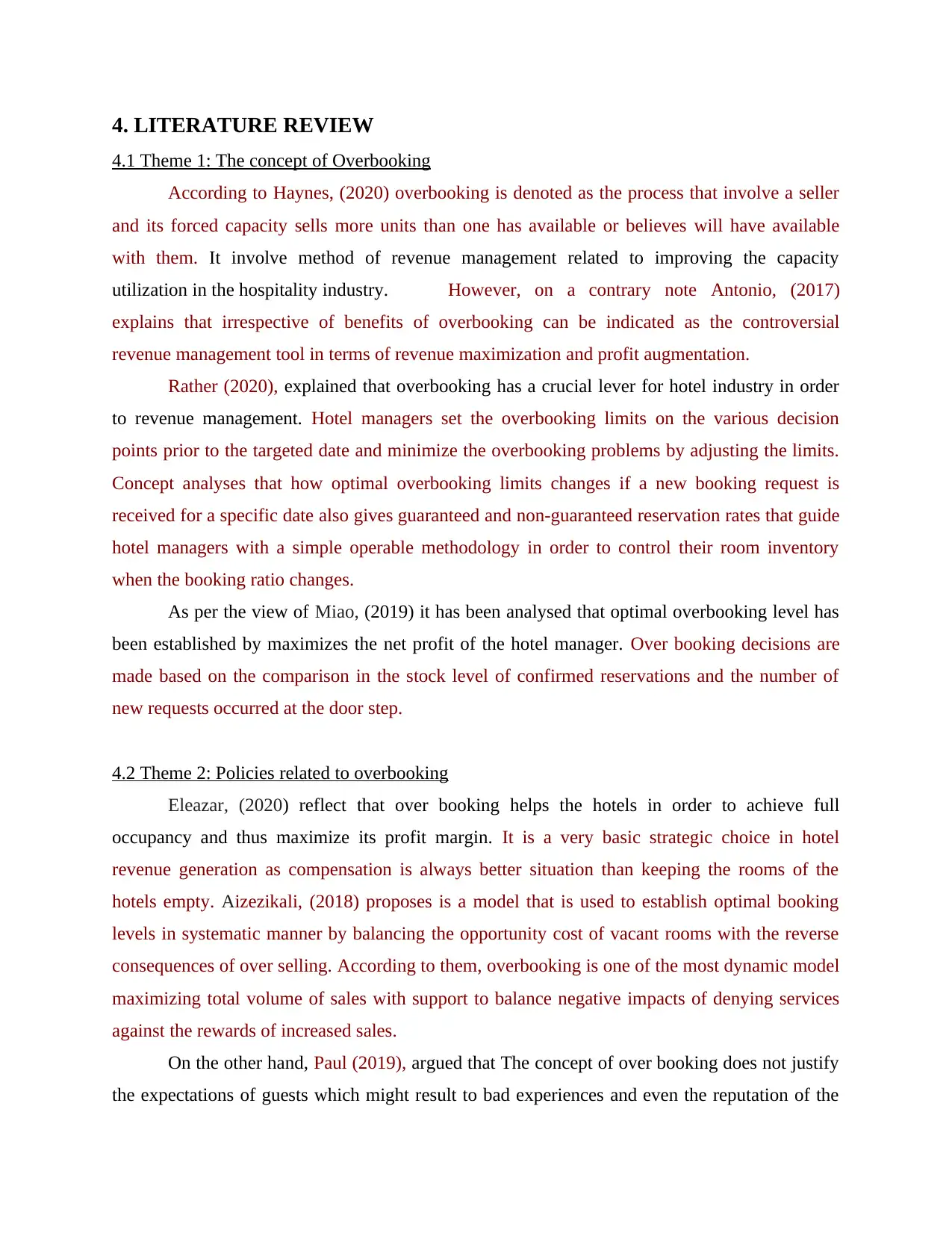
4. LITERATURE REVIEW
4.1 Theme 1: The concept of Overbooking
According to Haynes, (2020) overbooking is denoted as the process that involve a seller
and its forced capacity sells more units than one has available or believes will have available
with them. It involve method of revenue management related to improving the capacity
utilization in the hospitality industry. However, on a contrary note Antonio, (2017)
explains that irrespective of benefits of overbooking can be indicated as the controversial
revenue management tool in terms of revenue maximization and profit augmentation.
Rather (2020), explained that overbooking has a crucial lever for hotel industry in order
to revenue management. Hotel managers set the overbooking limits on the various decision
points prior to the targeted date and minimize the overbooking problems by adjusting the limits.
Concept analyses that how optimal overbooking limits changes if a new booking request is
received for a specific date also gives guaranteed and non-guaranteed reservation rates that guide
hotel managers with a simple operable methodology in order to control their room inventory
when the booking ratio changes.
As per the view of Miao, (2019) it has been analysed that optimal overbooking level has
been established by maximizes the net profit of the hotel manager. Over booking decisions are
made based on the comparison in the stock level of confirmed reservations and the number of
new requests occurred at the door step.
4.2 Theme 2: Policies related to overbooking
Eleazar, (2020) reflect that over booking helps the hotels in order to achieve full
occupancy and thus maximize its profit margin. It is a very basic strategic choice in hotel
revenue generation as compensation is always better situation than keeping the rooms of the
hotels empty. Aizezikali, (2018) proposes is a model that is used to establish optimal booking
levels in systematic manner by balancing the opportunity cost of vacant rooms with the reverse
consequences of over selling. According to them, overbooking is one of the most dynamic model
maximizing total volume of sales with support to balance negative impacts of denying services
against the rewards of increased sales.
On the other hand, Paul (2019), argued that The concept of over booking does not justify
the expectations of guests which might result to bad experiences and even the reputation of the
4.1 Theme 1: The concept of Overbooking
According to Haynes, (2020) overbooking is denoted as the process that involve a seller
and its forced capacity sells more units than one has available or believes will have available
with them. It involve method of revenue management related to improving the capacity
utilization in the hospitality industry. However, on a contrary note Antonio, (2017)
explains that irrespective of benefits of overbooking can be indicated as the controversial
revenue management tool in terms of revenue maximization and profit augmentation.
Rather (2020), explained that overbooking has a crucial lever for hotel industry in order
to revenue management. Hotel managers set the overbooking limits on the various decision
points prior to the targeted date and minimize the overbooking problems by adjusting the limits.
Concept analyses that how optimal overbooking limits changes if a new booking request is
received for a specific date also gives guaranteed and non-guaranteed reservation rates that guide
hotel managers with a simple operable methodology in order to control their room inventory
when the booking ratio changes.
As per the view of Miao, (2019) it has been analysed that optimal overbooking level has
been established by maximizes the net profit of the hotel manager. Over booking decisions are
made based on the comparison in the stock level of confirmed reservations and the number of
new requests occurred at the door step.
4.2 Theme 2: Policies related to overbooking
Eleazar, (2020) reflect that over booking helps the hotels in order to achieve full
occupancy and thus maximize its profit margin. It is a very basic strategic choice in hotel
revenue generation as compensation is always better situation than keeping the rooms of the
hotels empty. Aizezikali, (2018) proposes is a model that is used to establish optimal booking
levels in systematic manner by balancing the opportunity cost of vacant rooms with the reverse
consequences of over selling. According to them, overbooking is one of the most dynamic model
maximizing total volume of sales with support to balance negative impacts of denying services
against the rewards of increased sales.
On the other hand, Paul (2019), argued that The concept of over booking does not justify
the expectations of guests which might result to bad experiences and even the reputation of the
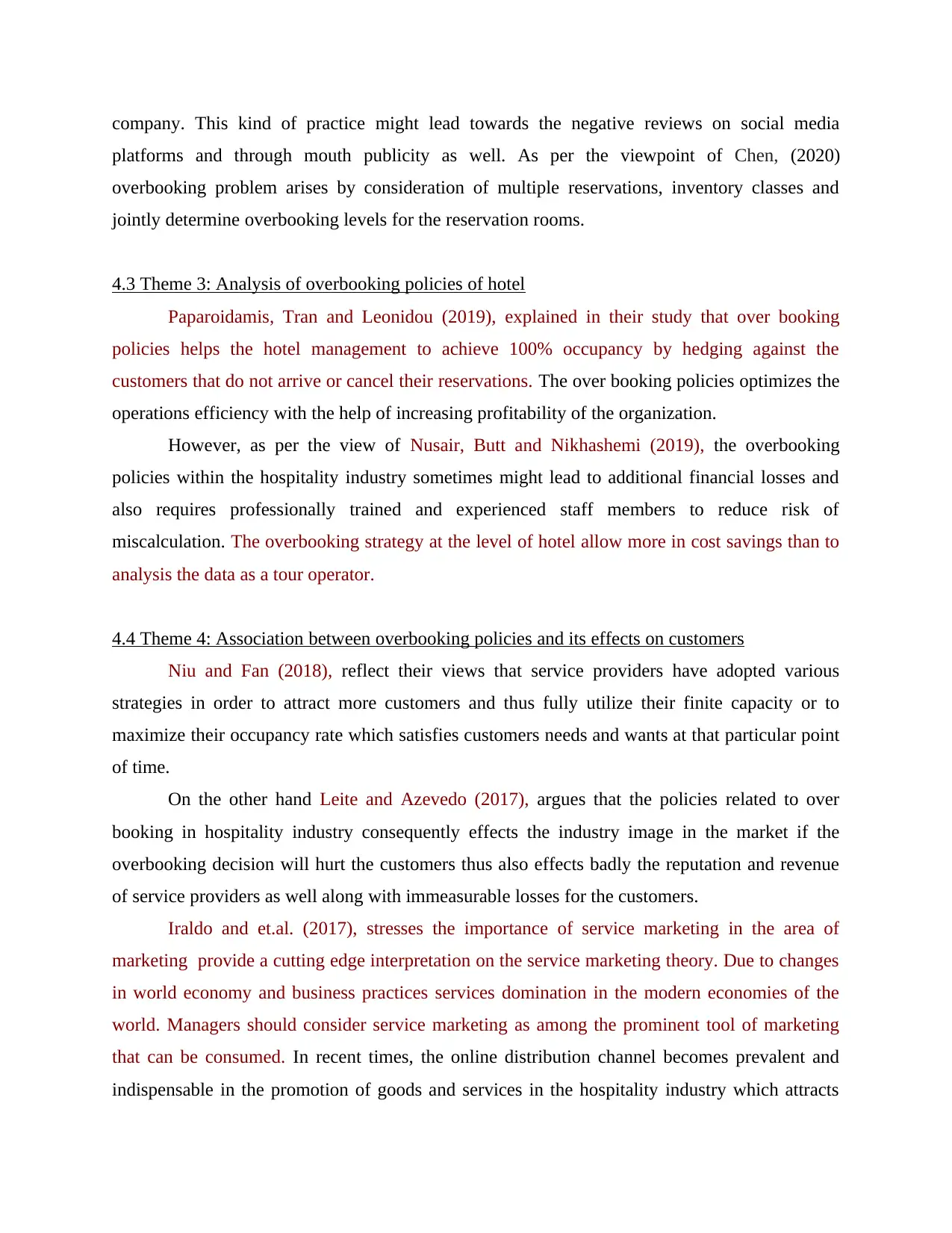
company. This kind of practice might lead towards the negative reviews on social media
platforms and through mouth publicity as well. As per the viewpoint of Chen, (2020)
overbooking problem arises by consideration of multiple reservations, inventory classes and
jointly determine overbooking levels for the reservation rooms.
4.3 Theme 3: Analysis of overbooking policies of hotel
Paparoidamis, Tran and Leonidou (2019), explained in their study that over booking
policies helps the hotel management to achieve 100% occupancy by hedging against the
customers that do not arrive or cancel their reservations. The over booking policies optimizes the
operations efficiency with the help of increasing profitability of the organization.
However, as per the view of Nusair, Butt and Nikhashemi (2019), the overbooking
policies within the hospitality industry sometimes might lead to additional financial losses and
also requires professionally trained and experienced staff members to reduce risk of
miscalculation. The overbooking strategy at the level of hotel allow more in cost savings than to
analysis the data as a tour operator.
4.4 Theme 4: Association between overbooking policies and its effects on customers
Niu and Fan (2018), reflect their views that service providers have adopted various
strategies in order to attract more customers and thus fully utilize their finite capacity or to
maximize their occupancy rate which satisfies customers needs and wants at that particular point
of time.
On the other hand Leite and Azevedo (2017), argues that the policies related to over
booking in hospitality industry consequently effects the industry image in the market if the
overbooking decision will hurt the customers thus also effects badly the reputation and revenue
of service providers as well along with immeasurable losses for the customers.
Iraldo and et.al. (2017), stresses the importance of service marketing in the area of
marketing provide a cutting edge interpretation on the service marketing theory. Due to changes
in world economy and business practices services domination in the modern economies of the
world. Managers should consider service marketing as among the prominent tool of marketing
that can be consumed. In recent times, the online distribution channel becomes prevalent and
indispensable in the promotion of goods and services in the hospitality industry which attracts
platforms and through mouth publicity as well. As per the viewpoint of Chen, (2020)
overbooking problem arises by consideration of multiple reservations, inventory classes and
jointly determine overbooking levels for the reservation rooms.
4.3 Theme 3: Analysis of overbooking policies of hotel
Paparoidamis, Tran and Leonidou (2019), explained in their study that over booking
policies helps the hotel management to achieve 100% occupancy by hedging against the
customers that do not arrive or cancel their reservations. The over booking policies optimizes the
operations efficiency with the help of increasing profitability of the organization.
However, as per the view of Nusair, Butt and Nikhashemi (2019), the overbooking
policies within the hospitality industry sometimes might lead to additional financial losses and
also requires professionally trained and experienced staff members to reduce risk of
miscalculation. The overbooking strategy at the level of hotel allow more in cost savings than to
analysis the data as a tour operator.
4.4 Theme 4: Association between overbooking policies and its effects on customers
Niu and Fan (2018), reflect their views that service providers have adopted various
strategies in order to attract more customers and thus fully utilize their finite capacity or to
maximize their occupancy rate which satisfies customers needs and wants at that particular point
of time.
On the other hand Leite and Azevedo (2017), argues that the policies related to over
booking in hospitality industry consequently effects the industry image in the market if the
overbooking decision will hurt the customers thus also effects badly the reputation and revenue
of service providers as well along with immeasurable losses for the customers.
Iraldo and et.al. (2017), stresses the importance of service marketing in the area of
marketing provide a cutting edge interpretation on the service marketing theory. Due to changes
in world economy and business practices services domination in the modern economies of the
world. Managers should consider service marketing as among the prominent tool of marketing
that can be consumed. In recent times, the online distribution channel becomes prevalent and
indispensable in the promotion of goods and services in the hospitality industry which attracts
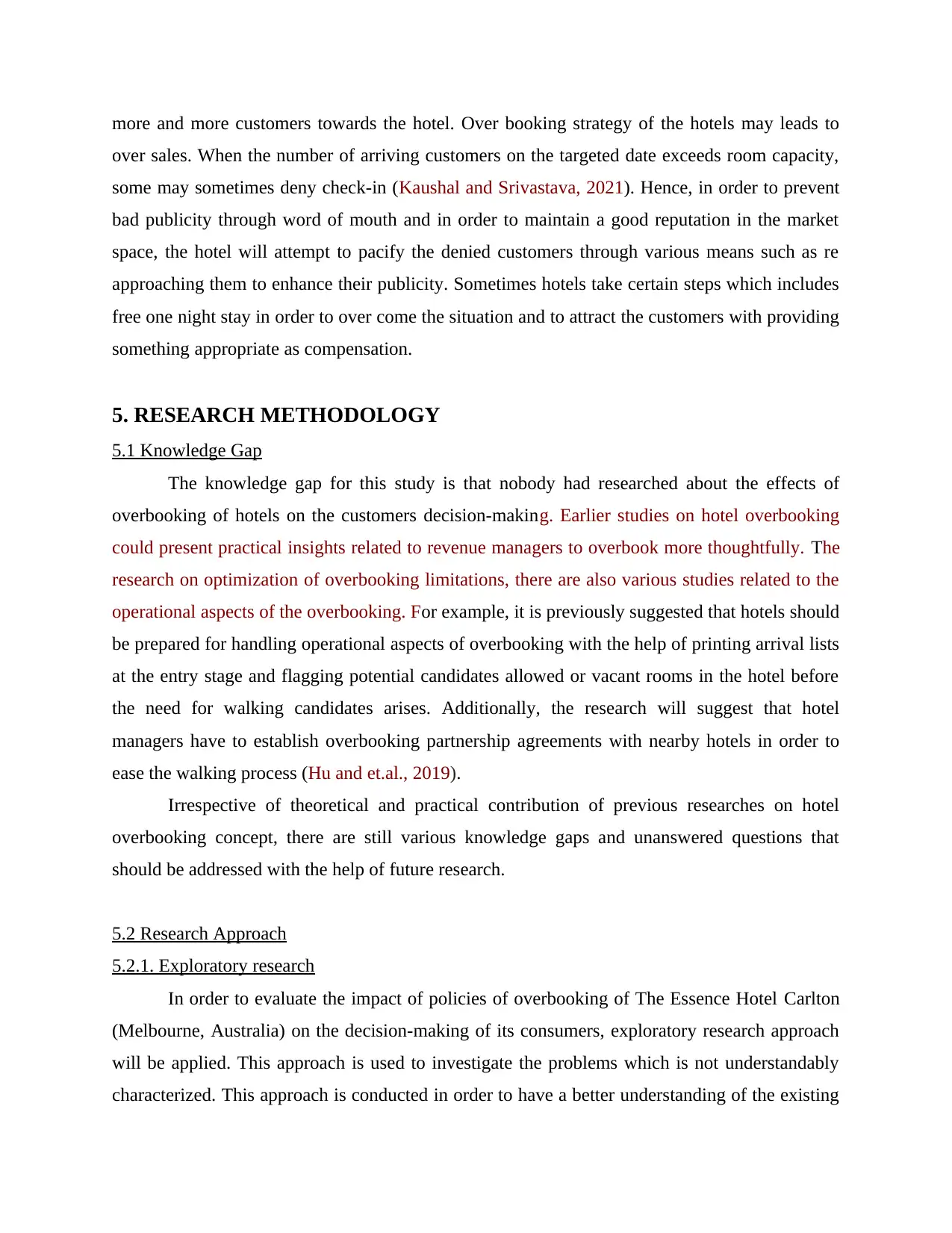
more and more customers towards the hotel. Over booking strategy of the hotels may leads to
over sales. When the number of arriving customers on the targeted date exceeds room capacity,
some may sometimes deny check-in (Kaushal and Srivastava, 2021). Hence, in order to prevent
bad publicity through word of mouth and in order to maintain a good reputation in the market
space, the hotel will attempt to pacify the denied customers through various means such as re
approaching them to enhance their publicity. Sometimes hotels take certain steps which includes
free one night stay in order to over come the situation and to attract the customers with providing
something appropriate as compensation.
5. RESEARCH METHODOLOGY
5.1 Knowledge Gap
The knowledge gap for this study is that nobody had researched about the effects of
overbooking of hotels on the customers decision-making. Earlier studies on hotel overbooking
could present practical insights related to revenue managers to overbook more thoughtfully. The
research on optimization of overbooking limitations, there are also various studies related to the
operational aspects of the overbooking. For example, it is previously suggested that hotels should
be prepared for handling operational aspects of overbooking with the help of printing arrival lists
at the entry stage and flagging potential candidates allowed or vacant rooms in the hotel before
the need for walking candidates arises. Additionally, the research will suggest that hotel
managers have to establish overbooking partnership agreements with nearby hotels in order to
ease the walking process (Hu and et.al., 2019).
Irrespective of theoretical and practical contribution of previous researches on hotel
overbooking concept, there are still various knowledge gaps and unanswered questions that
should be addressed with the help of future research.
5.2 Research Approach
5.2.1. Exploratory research
In order to evaluate the impact of policies of overbooking of The Essence Hotel Carlton
(Melbourne, Australia) on the decision-making of its consumers, exploratory research approach
will be applied. This approach is used to investigate the problems which is not understandably
characterized. This approach is conducted in order to have a better understanding of the existing
over sales. When the number of arriving customers on the targeted date exceeds room capacity,
some may sometimes deny check-in (Kaushal and Srivastava, 2021). Hence, in order to prevent
bad publicity through word of mouth and in order to maintain a good reputation in the market
space, the hotel will attempt to pacify the denied customers through various means such as re
approaching them to enhance their publicity. Sometimes hotels take certain steps which includes
free one night stay in order to over come the situation and to attract the customers with providing
something appropriate as compensation.
5. RESEARCH METHODOLOGY
5.1 Knowledge Gap
The knowledge gap for this study is that nobody had researched about the effects of
overbooking of hotels on the customers decision-making. Earlier studies on hotel overbooking
could present practical insights related to revenue managers to overbook more thoughtfully. The
research on optimization of overbooking limitations, there are also various studies related to the
operational aspects of the overbooking. For example, it is previously suggested that hotels should
be prepared for handling operational aspects of overbooking with the help of printing arrival lists
at the entry stage and flagging potential candidates allowed or vacant rooms in the hotel before
the need for walking candidates arises. Additionally, the research will suggest that hotel
managers have to establish overbooking partnership agreements with nearby hotels in order to
ease the walking process (Hu and et.al., 2019).
Irrespective of theoretical and practical contribution of previous researches on hotel
overbooking concept, there are still various knowledge gaps and unanswered questions that
should be addressed with the help of future research.
5.2 Research Approach
5.2.1. Exploratory research
In order to evaluate the impact of policies of overbooking of The Essence Hotel Carlton
(Melbourne, Australia) on the decision-making of its consumers, exploratory research approach
will be applied. This approach is used to investigate the problems which is not understandably
characterized. This approach is conducted in order to have a better understanding of the existing
Paraphrase This Document
Need a fresh take? Get an instant paraphrase of this document with our AI Paraphraser
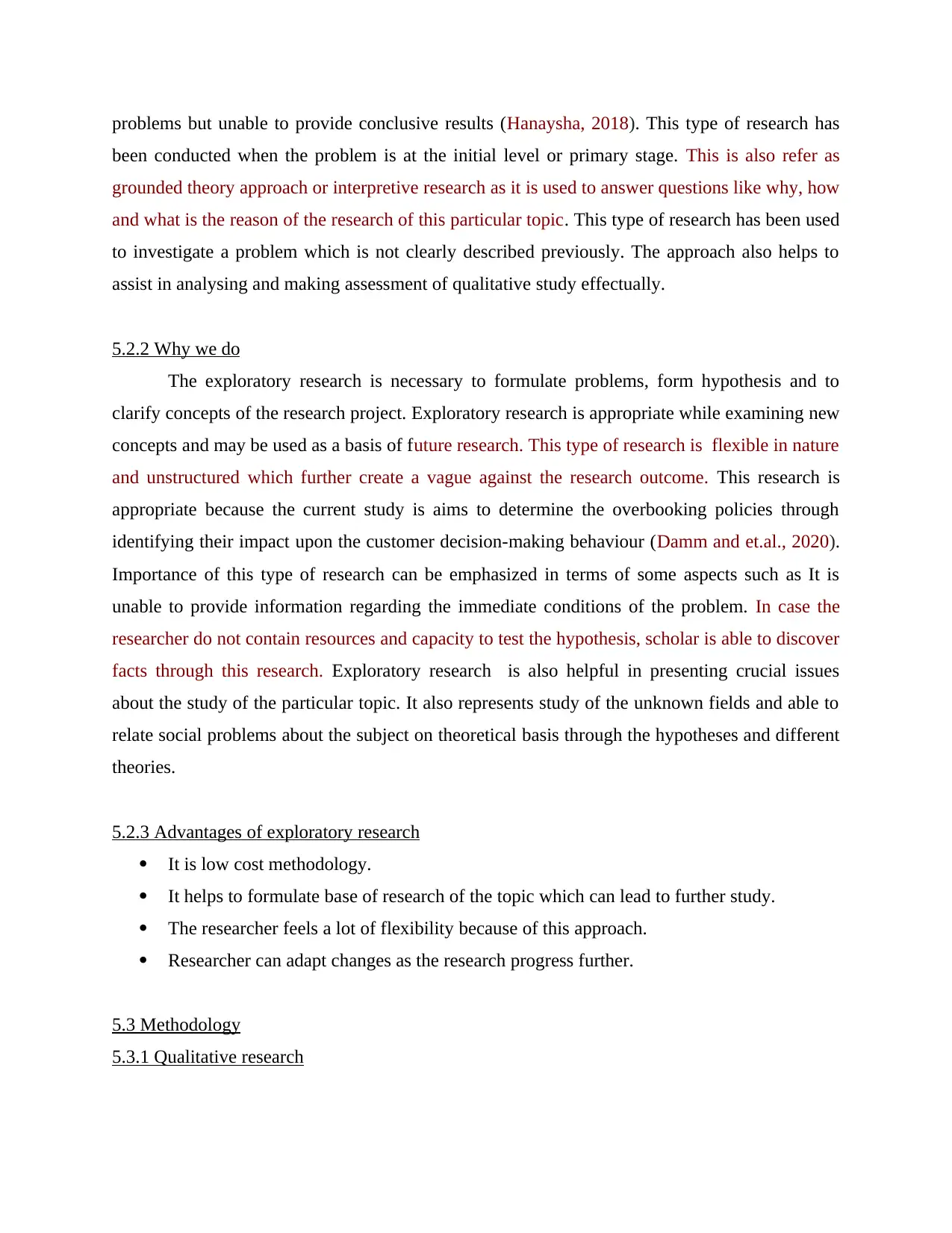
problems but unable to provide conclusive results (Hanaysha, 2018). This type of research has
been conducted when the problem is at the initial level or primary stage. This is also refer as
grounded theory approach or interpretive research as it is used to answer questions like why, how
and what is the reason of the research of this particular topic. This type of research has been used
to investigate a problem which is not clearly described previously. The approach also helps to
assist in analysing and making assessment of qualitative study effectually.
5.2.2 Why we do
The exploratory research is necessary to formulate problems, form hypothesis and to
clarify concepts of the research project. Exploratory research is appropriate while examining new
concepts and may be used as a basis of future research. This type of research is flexible in nature
and unstructured which further create a vague against the research outcome. This research is
appropriate because the current study is aims to determine the overbooking policies through
identifying their impact upon the customer decision-making behaviour (Damm and et.al., 2020).
Importance of this type of research can be emphasized in terms of some aspects such as It is
unable to provide information regarding the immediate conditions of the problem. In case the
researcher do not contain resources and capacity to test the hypothesis, scholar is able to discover
facts through this research. Exploratory research is also helpful in presenting crucial issues
about the study of the particular topic. It also represents study of the unknown fields and able to
relate social problems about the subject on theoretical basis through the hypotheses and different
theories.
5.2.3 Advantages of exploratory research
It is low cost methodology.
It helps to formulate base of research of the topic which can lead to further study.
The researcher feels a lot of flexibility because of this approach.
Researcher can adapt changes as the research progress further.
5.3 Methodology
5.3.1 Qualitative research
been conducted when the problem is at the initial level or primary stage. This is also refer as
grounded theory approach or interpretive research as it is used to answer questions like why, how
and what is the reason of the research of this particular topic. This type of research has been used
to investigate a problem which is not clearly described previously. The approach also helps to
assist in analysing and making assessment of qualitative study effectually.
5.2.2 Why we do
The exploratory research is necessary to formulate problems, form hypothesis and to
clarify concepts of the research project. Exploratory research is appropriate while examining new
concepts and may be used as a basis of future research. This type of research is flexible in nature
and unstructured which further create a vague against the research outcome. This research is
appropriate because the current study is aims to determine the overbooking policies through
identifying their impact upon the customer decision-making behaviour (Damm and et.al., 2020).
Importance of this type of research can be emphasized in terms of some aspects such as It is
unable to provide information regarding the immediate conditions of the problem. In case the
researcher do not contain resources and capacity to test the hypothesis, scholar is able to discover
facts through this research. Exploratory research is also helpful in presenting crucial issues
about the study of the particular topic. It also represents study of the unknown fields and able to
relate social problems about the subject on theoretical basis through the hypotheses and different
theories.
5.2.3 Advantages of exploratory research
It is low cost methodology.
It helps to formulate base of research of the topic which can lead to further study.
The researcher feels a lot of flexibility because of this approach.
Researcher can adapt changes as the research progress further.
5.3 Methodology
5.3.1 Qualitative research
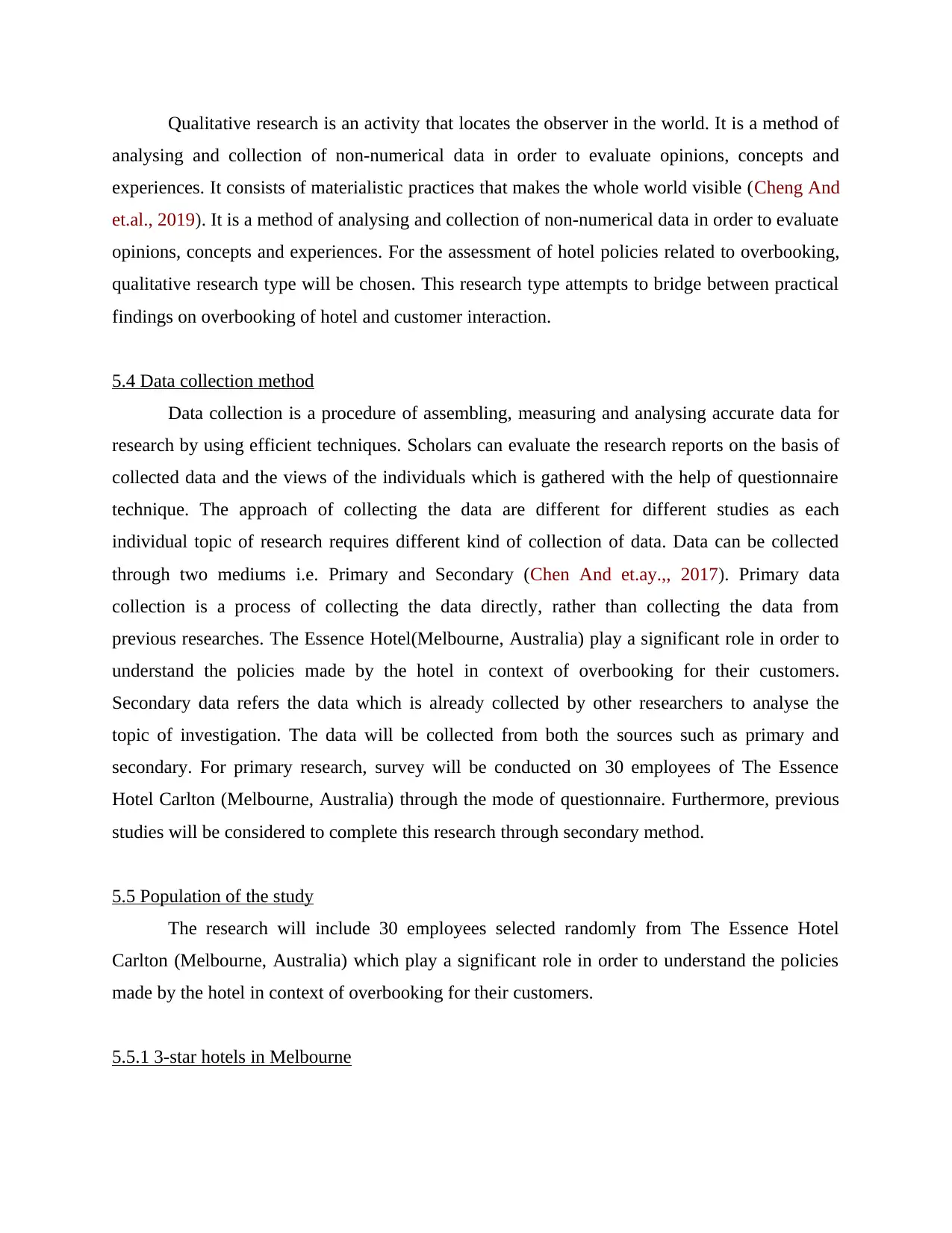
Qualitative research is an activity that locates the observer in the world. It is a method of
analysing and collection of non-numerical data in order to evaluate opinions, concepts and
experiences. It consists of materialistic practices that makes the whole world visible (Cheng And
et.al., 2019). It is a method of analysing and collection of non-numerical data in order to evaluate
opinions, concepts and experiences. For the assessment of hotel policies related to overbooking,
qualitative research type will be chosen. This research type attempts to bridge between practical
findings on overbooking of hotel and customer interaction.
5.4 Data collection method
Data collection is a procedure of assembling, measuring and analysing accurate data for
research by using efficient techniques. Scholars can evaluate the research reports on the basis of
collected data and the views of the individuals which is gathered with the help of questionnaire
technique. The approach of collecting the data are different for different studies as each
individual topic of research requires different kind of collection of data. Data can be collected
through two mediums i.e. Primary and Secondary (Chen And et.ay.,, 2017). Primary data
collection is a process of collecting the data directly, rather than collecting the data from
previous researches. The Essence Hotel(Melbourne, Australia) play a significant role in order to
understand the policies made by the hotel in context of overbooking for their customers.
Secondary data refers the data which is already collected by other researchers to analyse the
topic of investigation. The data will be collected from both the sources such as primary and
secondary. For primary research, survey will be conducted on 30 employees of The Essence
Hotel Carlton (Melbourne, Australia) through the mode of questionnaire. Furthermore, previous
studies will be considered to complete this research through secondary method.
5.5 Population of the study
The research will include 30 employees selected randomly from The Essence Hotel
Carlton (Melbourne, Australia) which play a significant role in order to understand the policies
made by the hotel in context of overbooking for their customers.
5.5.1 3-star hotels in Melbourne
analysing and collection of non-numerical data in order to evaluate opinions, concepts and
experiences. It consists of materialistic practices that makes the whole world visible (Cheng And
et.al., 2019). It is a method of analysing and collection of non-numerical data in order to evaluate
opinions, concepts and experiences. For the assessment of hotel policies related to overbooking,
qualitative research type will be chosen. This research type attempts to bridge between practical
findings on overbooking of hotel and customer interaction.
5.4 Data collection method
Data collection is a procedure of assembling, measuring and analysing accurate data for
research by using efficient techniques. Scholars can evaluate the research reports on the basis of
collected data and the views of the individuals which is gathered with the help of questionnaire
technique. The approach of collecting the data are different for different studies as each
individual topic of research requires different kind of collection of data. Data can be collected
through two mediums i.e. Primary and Secondary (Chen And et.ay.,, 2017). Primary data
collection is a process of collecting the data directly, rather than collecting the data from
previous researches. The Essence Hotel(Melbourne, Australia) play a significant role in order to
understand the policies made by the hotel in context of overbooking for their customers.
Secondary data refers the data which is already collected by other researchers to analyse the
topic of investigation. The data will be collected from both the sources such as primary and
secondary. For primary research, survey will be conducted on 30 employees of The Essence
Hotel Carlton (Melbourne, Australia) through the mode of questionnaire. Furthermore, previous
studies will be considered to complete this research through secondary method.
5.5 Population of the study
The research will include 30 employees selected randomly from The Essence Hotel
Carlton (Melbourne, Australia) which play a significant role in order to understand the policies
made by the hotel in context of overbooking for their customers.
5.5.1 3-star hotels in Melbourne
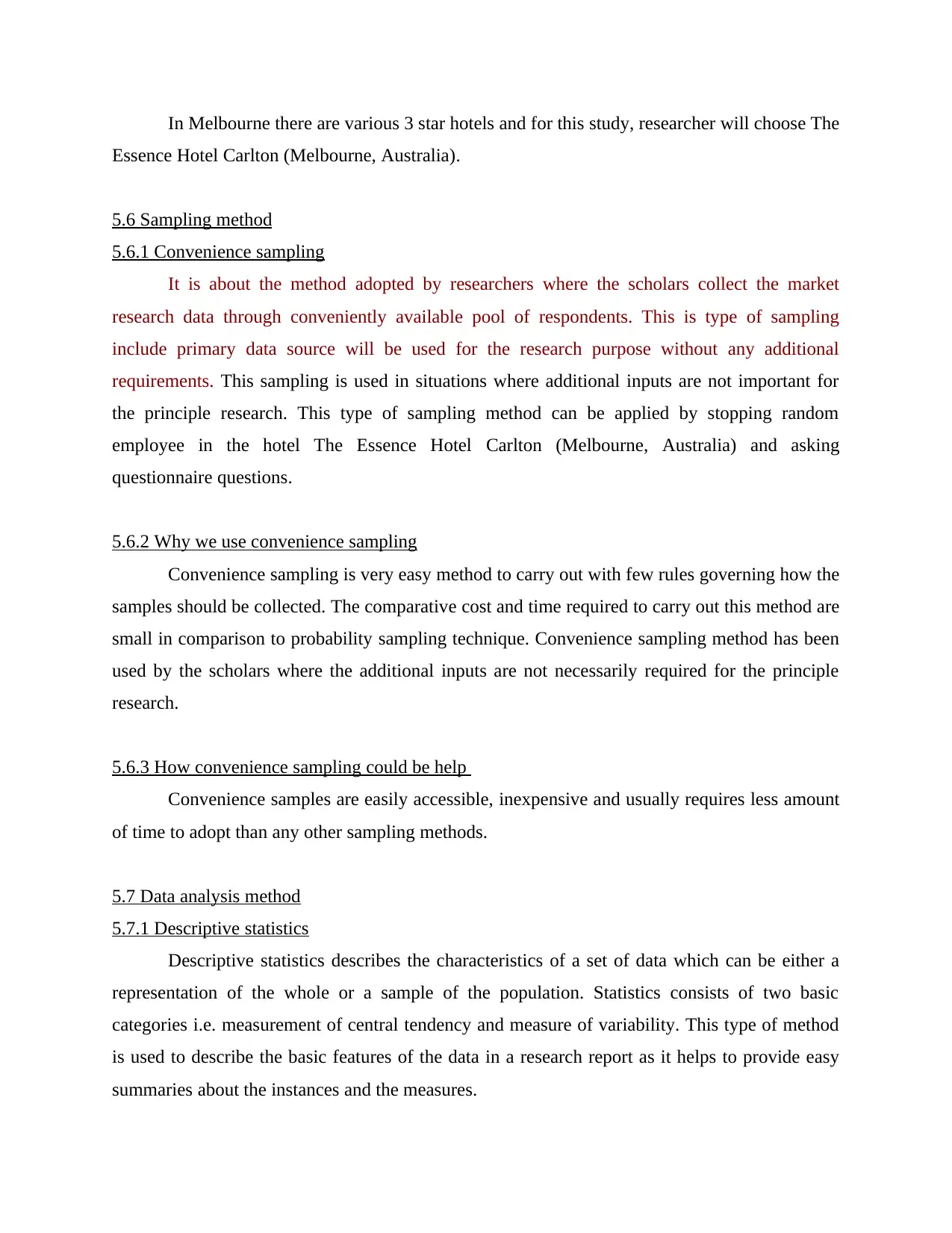
In Melbourne there are various 3 star hotels and for this study, researcher will choose The
Essence Hotel Carlton (Melbourne, Australia).
5.6 Sampling method
5.6.1 Convenience sampling
It is about the method adopted by researchers where the scholars collect the market
research data through conveniently available pool of respondents. This is type of sampling
include primary data source will be used for the research purpose without any additional
requirements. This sampling is used in situations where additional inputs are not important for
the principle research. This type of sampling method can be applied by stopping random
employee in the hotel The Essence Hotel Carlton (Melbourne, Australia) and asking
questionnaire questions.
5.6.2 Why we use convenience sampling
Convenience sampling is very easy method to carry out with few rules governing how the
samples should be collected. The comparative cost and time required to carry out this method are
small in comparison to probability sampling technique. Convenience sampling method has been
used by the scholars where the additional inputs are not necessarily required for the principle
research.
5.6.3 How convenience sampling could be help
Convenience samples are easily accessible, inexpensive and usually requires less amount
of time to adopt than any other sampling methods.
5.7 Data analysis method
5.7.1 Descriptive statistics
Descriptive statistics describes the characteristics of a set of data which can be either a
representation of the whole or a sample of the population. Statistics consists of two basic
categories i.e. measurement of central tendency and measure of variability. This type of method
is used to describe the basic features of the data in a research report as it helps to provide easy
summaries about the instances and the measures.
Essence Hotel Carlton (Melbourne, Australia).
5.6 Sampling method
5.6.1 Convenience sampling
It is about the method adopted by researchers where the scholars collect the market
research data through conveniently available pool of respondents. This is type of sampling
include primary data source will be used for the research purpose without any additional
requirements. This sampling is used in situations where additional inputs are not important for
the principle research. This type of sampling method can be applied by stopping random
employee in the hotel The Essence Hotel Carlton (Melbourne, Australia) and asking
questionnaire questions.
5.6.2 Why we use convenience sampling
Convenience sampling is very easy method to carry out with few rules governing how the
samples should be collected. The comparative cost and time required to carry out this method are
small in comparison to probability sampling technique. Convenience sampling method has been
used by the scholars where the additional inputs are not necessarily required for the principle
research.
5.6.3 How convenience sampling could be help
Convenience samples are easily accessible, inexpensive and usually requires less amount
of time to adopt than any other sampling methods.
5.7 Data analysis method
5.7.1 Descriptive statistics
Descriptive statistics describes the characteristics of a set of data which can be either a
representation of the whole or a sample of the population. Statistics consists of two basic
categories i.e. measurement of central tendency and measure of variability. This type of method
is used to describe the basic features of the data in a research report as it helps to provide easy
summaries about the instances and the measures.
Secure Best Marks with AI Grader
Need help grading? Try our AI Grader for instant feedback on your assignments.
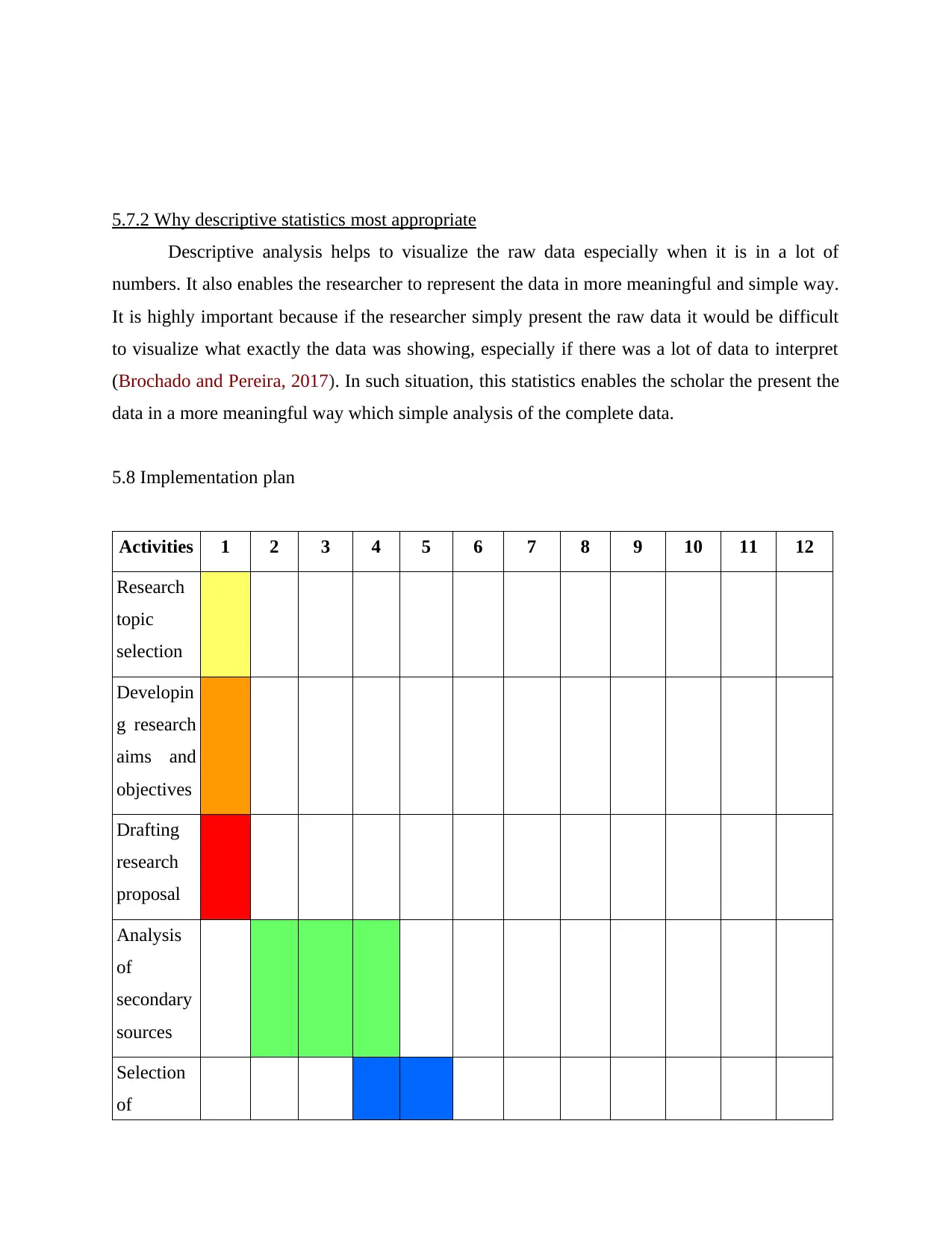
5.7.2 Why descriptive statistics most appropriate
Descriptive analysis helps to visualize the raw data especially when it is in a lot of
numbers. It also enables the researcher to represent the data in more meaningful and simple way.
It is highly important because if the researcher simply present the raw data it would be difficult
to visualize what exactly the data was showing, especially if there was a lot of data to interpret
(Brochado and Pereira, 2017). In such situation, this statistics enables the scholar the present the
data in a more meaningful way which simple analysis of the complete data.
5.8 Implementation plan
Activities 1 2 3 4 5 6 7 8 9 10 11 12
Research
topic
selection
Developin
g research
aims and
objectives
Drafting
research
proposal
Analysis
of
secondary
sources
Selection
of
Descriptive analysis helps to visualize the raw data especially when it is in a lot of
numbers. It also enables the researcher to represent the data in more meaningful and simple way.
It is highly important because if the researcher simply present the raw data it would be difficult
to visualize what exactly the data was showing, especially if there was a lot of data to interpret
(Brochado and Pereira, 2017). In such situation, this statistics enables the scholar the present the
data in a more meaningful way which simple analysis of the complete data.
5.8 Implementation plan
Activities 1 2 3 4 5 6 7 8 9 10 11 12
Research
topic
selection
Developin
g research
aims and
objectives
Drafting
research
proposal
Analysis
of
secondary
sources
Selection
of
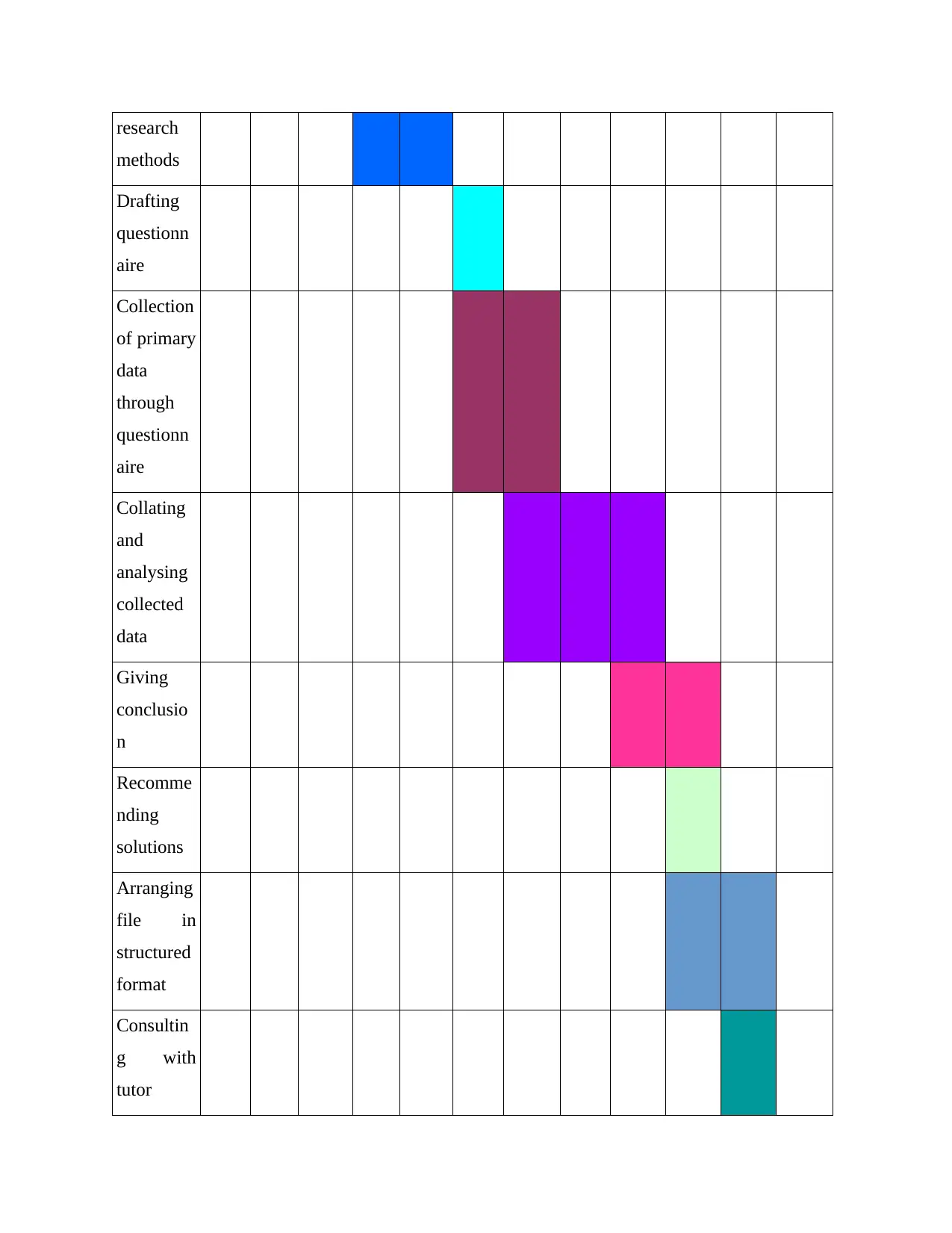
research
methods
Drafting
questionn
aire
Collection
of primary
data
through
questionn
aire
Collating
and
analysing
collected
data
Giving
conclusio
n
Recomme
nding
solutions
Arranging
file in
structured
format
Consultin
g with
tutor
methods
Drafting
questionn
aire
Collection
of primary
data
through
questionn
aire
Collating
and
analysing
collected
data
Giving
conclusio
n
Recomme
nding
solutions
Arranging
file in
structured
format
Consultin
g with
tutor
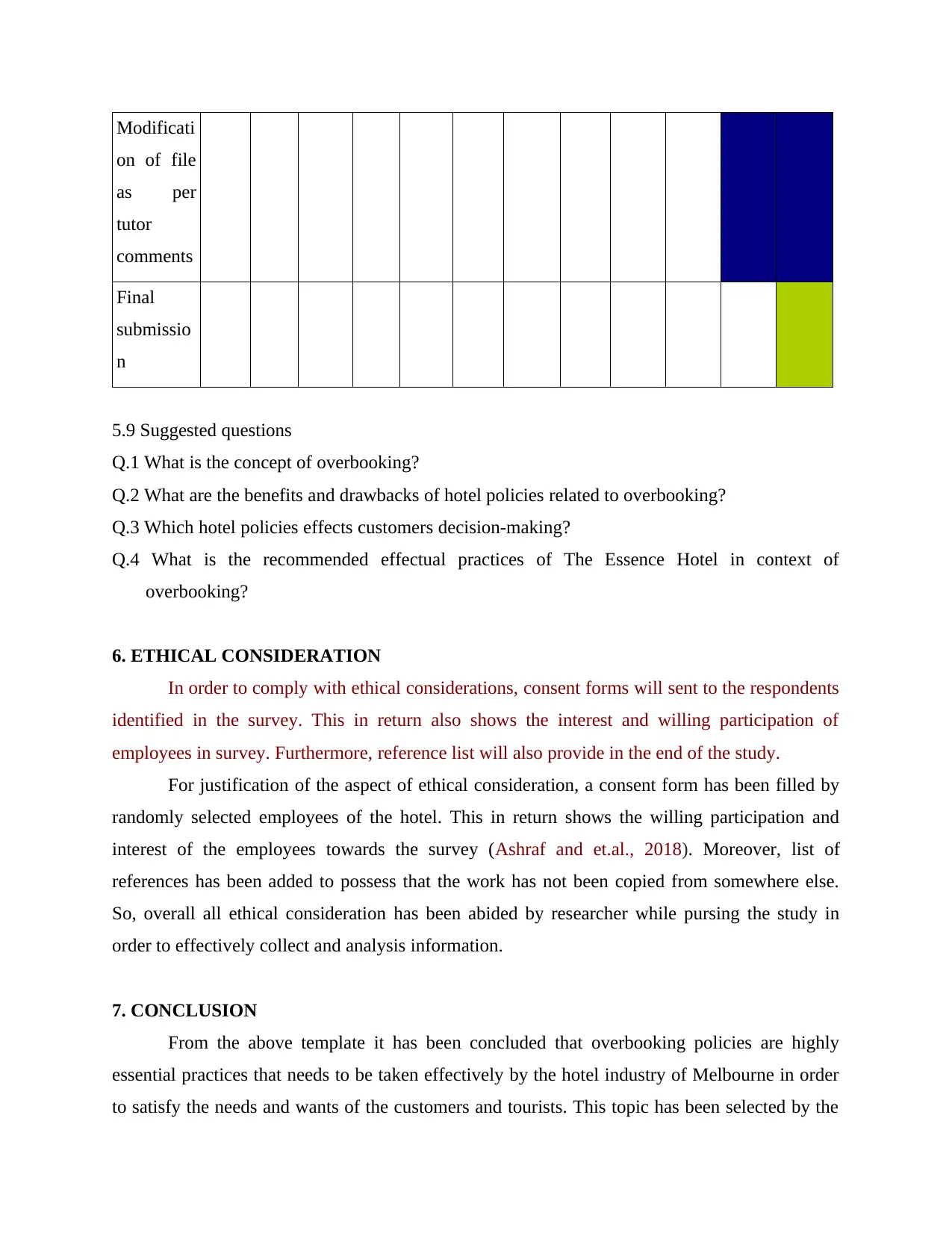
Modificati
on of file
as per
tutor
comments
Final
submissio
n
5.9 Suggested questions
Q.1 What is the concept of overbooking?
Q.2 What are the benefits and drawbacks of hotel policies related to overbooking?
Q.3 Which hotel policies effects customers decision-making?
Q.4 What is the recommended effectual practices of The Essence Hotel in context of
overbooking?
6. ETHICAL CONSIDERATION
In order to comply with ethical considerations, consent forms will sent to the respondents
identified in the survey. This in return also shows the interest and willing participation of
employees in survey. Furthermore, reference list will also provide in the end of the study.
For justification of the aspect of ethical consideration, a consent form has been filled by
randomly selected employees of the hotel. This in return shows the willing participation and
interest of the employees towards the survey (Ashraf and et.al., 2018). Moreover, list of
references has been added to possess that the work has not been copied from somewhere else.
So, overall all ethical consideration has been abided by researcher while pursing the study in
order to effectively collect and analysis information.
7. CONCLUSION
From the above template it has been concluded that overbooking policies are highly
essential practices that needs to be taken effectively by the hotel industry of Melbourne in order
to satisfy the needs and wants of the customers and tourists. This topic has been selected by the
on of file
as per
tutor
comments
Final
submissio
n
5.9 Suggested questions
Q.1 What is the concept of overbooking?
Q.2 What are the benefits and drawbacks of hotel policies related to overbooking?
Q.3 Which hotel policies effects customers decision-making?
Q.4 What is the recommended effectual practices of The Essence Hotel in context of
overbooking?
6. ETHICAL CONSIDERATION
In order to comply with ethical considerations, consent forms will sent to the respondents
identified in the survey. This in return also shows the interest and willing participation of
employees in survey. Furthermore, reference list will also provide in the end of the study.
For justification of the aspect of ethical consideration, a consent form has been filled by
randomly selected employees of the hotel. This in return shows the willing participation and
interest of the employees towards the survey (Ashraf and et.al., 2018). Moreover, list of
references has been added to possess that the work has not been copied from somewhere else.
So, overall all ethical consideration has been abided by researcher while pursing the study in
order to effectively collect and analysis information.
7. CONCLUSION
From the above template it has been concluded that overbooking policies are highly
essential practices that needs to be taken effectively by the hotel industry of Melbourne in order
to satisfy the needs and wants of the customers and tourists. This topic has been selected by the
Paraphrase This Document
Need a fresh take? Get an instant paraphrase of this document with our AI Paraphraser
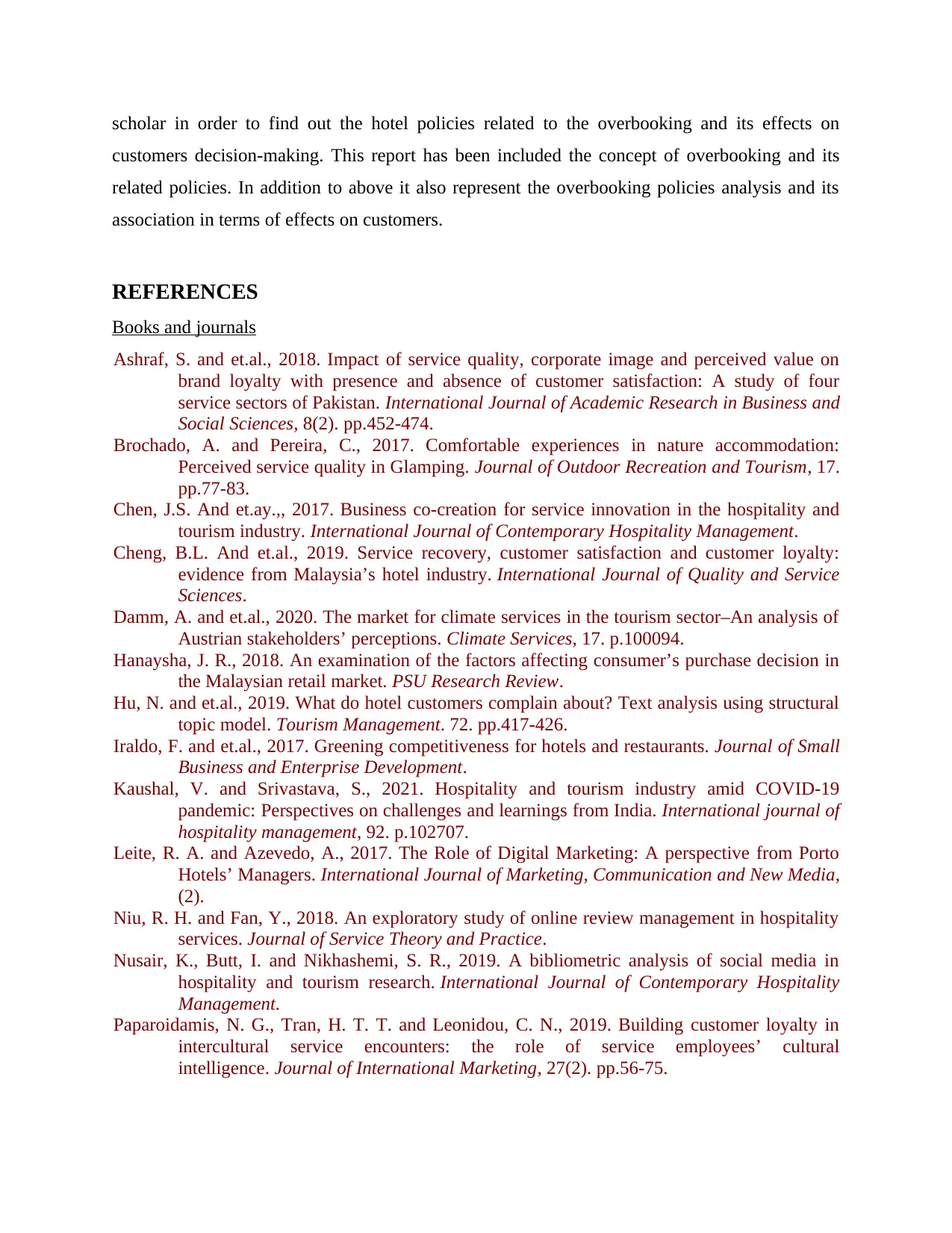
scholar in order to find out the hotel policies related to the overbooking and its effects on
customers decision-making. This report has been included the concept of overbooking and its
related policies. In addition to above it also represent the overbooking policies analysis and its
association in terms of effects on customers.
REFERENCES
Books and journals
Ashraf, S. and et.al., 2018. Impact of service quality, corporate image and perceived value on
brand loyalty with presence and absence of customer satisfaction: A study of four
service sectors of Pakistan. International Journal of Academic Research in Business and
Social Sciences, 8(2). pp.452-474.
Brochado, A. and Pereira, C., 2017. Comfortable experiences in nature accommodation:
Perceived service quality in Glamping. Journal of Outdoor Recreation and Tourism, 17.
pp.77-83.
Chen, J.S. And et.ay.,, 2017. Business co-creation for service innovation in the hospitality and
tourism industry. International Journal of Contemporary Hospitality Management.
Cheng, B.L. And et.al., 2019. Service recovery, customer satisfaction and customer loyalty:
evidence from Malaysia’s hotel industry. International Journal of Quality and Service
Sciences.
Damm, A. and et.al., 2020. The market for climate services in the tourism sector–An analysis of
Austrian stakeholders’ perceptions. Climate Services, 17. p.100094.
Hanaysha, J. R., 2018. An examination of the factors affecting consumer’s purchase decision in
the Malaysian retail market. PSU Research Review.
Hu, N. and et.al., 2019. What do hotel customers complain about? Text analysis using structural
topic model. Tourism Management. 72. pp.417-426.
Iraldo, F. and et.al., 2017. Greening competitiveness for hotels and restaurants. Journal of Small
Business and Enterprise Development.
Kaushal, V. and Srivastava, S., 2021. Hospitality and tourism industry amid COVID-19
pandemic: Perspectives on challenges and learnings from India. International journal of
hospitality management, 92. p.102707.
Leite, R. A. and Azevedo, A., 2017. The Role of Digital Marketing: A perspective from Porto
Hotels’ Managers. International Journal of Marketing, Communication and New Media,
(2).
Niu, R. H. and Fan, Y., 2018. An exploratory study of online review management in hospitality
services. Journal of Service Theory and Practice.
Nusair, K., Butt, I. and Nikhashemi, S. R., 2019. A bibliometric analysis of social media in
hospitality and tourism research. International Journal of Contemporary Hospitality
Management.
Paparoidamis, N. G., Tran, H. T. T. and Leonidou, C. N., 2019. Building customer loyalty in
intercultural service encounters: the role of service employees’ cultural
intelligence. Journal of International Marketing, 27(2). pp.56-75.
customers decision-making. This report has been included the concept of overbooking and its
related policies. In addition to above it also represent the overbooking policies analysis and its
association in terms of effects on customers.
REFERENCES
Books and journals
Ashraf, S. and et.al., 2018. Impact of service quality, corporate image and perceived value on
brand loyalty with presence and absence of customer satisfaction: A study of four
service sectors of Pakistan. International Journal of Academic Research in Business and
Social Sciences, 8(2). pp.452-474.
Brochado, A. and Pereira, C., 2017. Comfortable experiences in nature accommodation:
Perceived service quality in Glamping. Journal of Outdoor Recreation and Tourism, 17.
pp.77-83.
Chen, J.S. And et.ay.,, 2017. Business co-creation for service innovation in the hospitality and
tourism industry. International Journal of Contemporary Hospitality Management.
Cheng, B.L. And et.al., 2019. Service recovery, customer satisfaction and customer loyalty:
evidence from Malaysia’s hotel industry. International Journal of Quality and Service
Sciences.
Damm, A. and et.al., 2020. The market for climate services in the tourism sector–An analysis of
Austrian stakeholders’ perceptions. Climate Services, 17. p.100094.
Hanaysha, J. R., 2018. An examination of the factors affecting consumer’s purchase decision in
the Malaysian retail market. PSU Research Review.
Hu, N. and et.al., 2019. What do hotel customers complain about? Text analysis using structural
topic model. Tourism Management. 72. pp.417-426.
Iraldo, F. and et.al., 2017. Greening competitiveness for hotels and restaurants. Journal of Small
Business and Enterprise Development.
Kaushal, V. and Srivastava, S., 2021. Hospitality and tourism industry amid COVID-19
pandemic: Perspectives on challenges and learnings from India. International journal of
hospitality management, 92. p.102707.
Leite, R. A. and Azevedo, A., 2017. The Role of Digital Marketing: A perspective from Porto
Hotels’ Managers. International Journal of Marketing, Communication and New Media,
(2).
Niu, R. H. and Fan, Y., 2018. An exploratory study of online review management in hospitality
services. Journal of Service Theory and Practice.
Nusair, K., Butt, I. and Nikhashemi, S. R., 2019. A bibliometric analysis of social media in
hospitality and tourism research. International Journal of Contemporary Hospitality
Management.
Paparoidamis, N. G., Tran, H. T. T. and Leonidou, C. N., 2019. Building customer loyalty in
intercultural service encounters: the role of service employees’ cultural
intelligence. Journal of International Marketing, 27(2). pp.56-75.
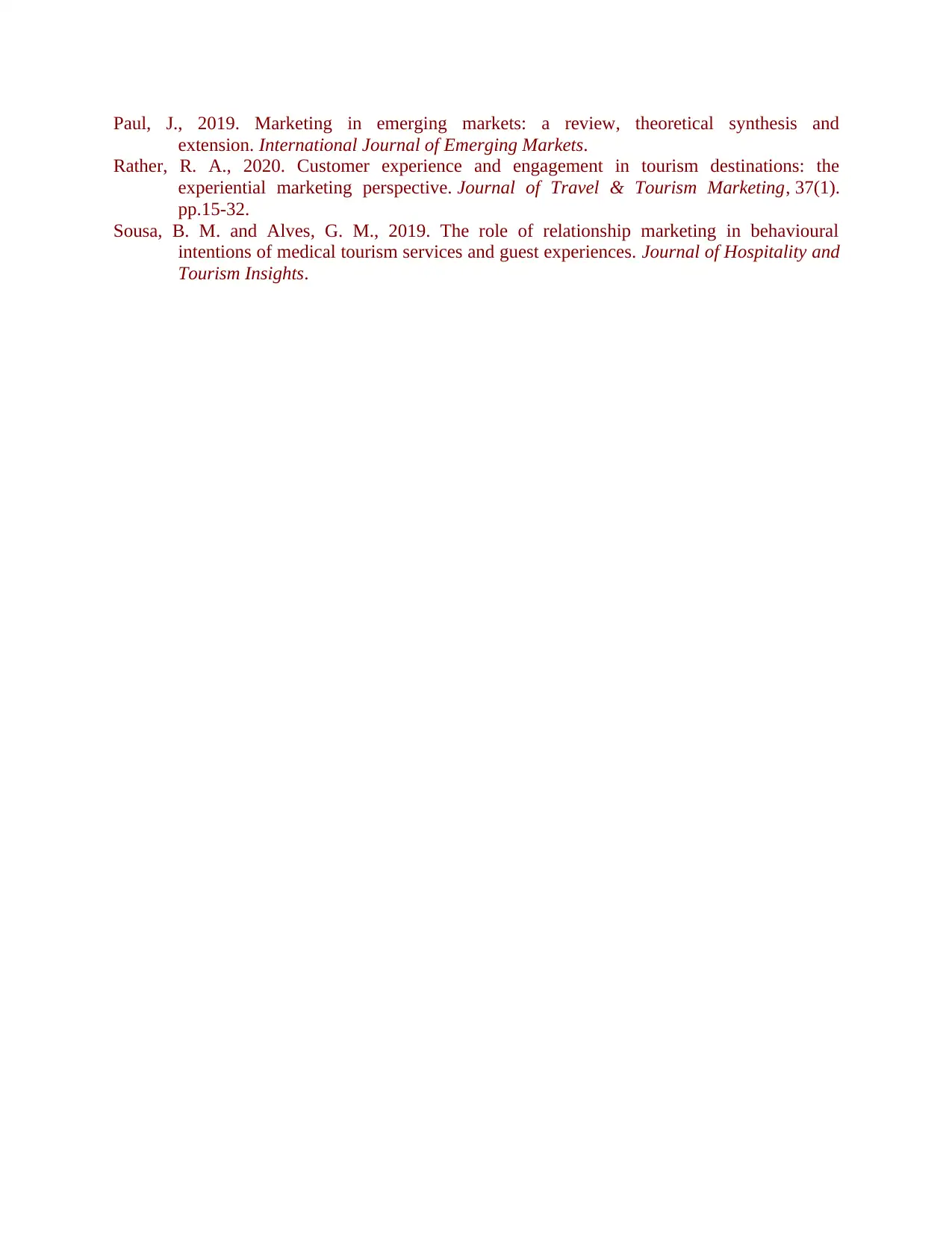
Paul, J., 2019. Marketing in emerging markets: a review, theoretical synthesis and
extension. International Journal of Emerging Markets.
Rather, R. A., 2020. Customer experience and engagement in tourism destinations: the
experiential marketing perspective. Journal of Travel & Tourism Marketing, 37(1).
pp.15-32.
Sousa, B. M. and Alves, G. M., 2019. The role of relationship marketing in behavioural
intentions of medical tourism services and guest experiences. Journal of Hospitality and
Tourism Insights.
extension. International Journal of Emerging Markets.
Rather, R. A., 2020. Customer experience and engagement in tourism destinations: the
experiential marketing perspective. Journal of Travel & Tourism Marketing, 37(1).
pp.15-32.
Sousa, B. M. and Alves, G. M., 2019. The role of relationship marketing in behavioural
intentions of medical tourism services and guest experiences. Journal of Hospitality and
Tourism Insights.
1 out of 15
Related Documents
Your All-in-One AI-Powered Toolkit for Academic Success.
+13062052269
info@desklib.com
Available 24*7 on WhatsApp / Email
![[object Object]](/_next/static/media/star-bottom.7253800d.svg)
Unlock your academic potential
© 2024 | Zucol Services PVT LTD | All rights reserved.





